
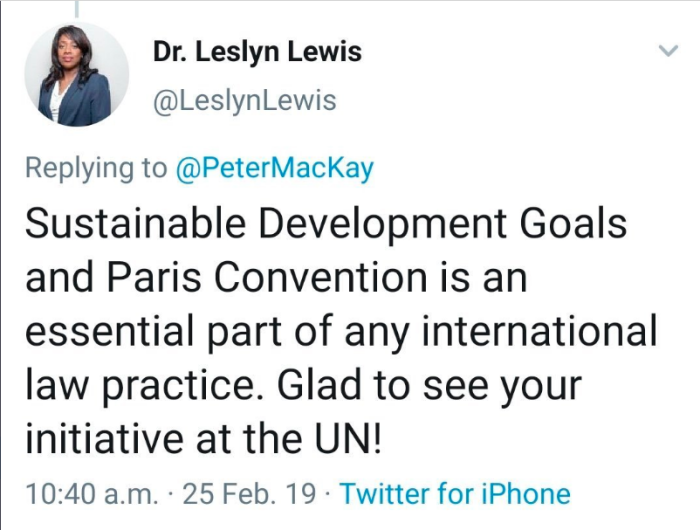
Leslyn Lewis finished her PhD dissertation in May 2019 from York University, in Toronto. It covered a number of legal areas around climate change, the Paris Accord, intellectual property, and trade agreements. Months after finishing, she ran for the leadership of the CPC, as Andrew Scheer had been forced out.
1. About Leslyn Lewis’ PhD Dissertation
To start out: the quality of the writing is very good. The content is well organized and the paper well cited. This wasn’t just some mess hastily thrown together. This is not to question her reading or writing abilities — which are impressive — but to ask ideologically what she stands for.
However, the concern now starts to creep in. This wasn’t some undergraduate paper written 20 or 30 years ago, but Lewis’ PhD dissertation. She finished it in 2019, at the age of 48.
From the content of the paper, it seems clear that Lewis fully embraces the climate change scam as a reality. She supports the Paris Agreement, despite its explicit and repeated focus on “climate finance, and its focus on “alternative energy sources”. She appears to have bought into the green agenda. The paper itself discusses (among other things), how trade agreements and intellectual property disputes can impede efforts to fight climate change.
Less than a year later, Lewis, (a political unknown), would be running for the Conservative Party of Canada leadership. She finished 3rd. Like most “conservatives”, she sings the praises of the UNSDA and Paris Accord, only objecting to a Carbon tax.
Lewis also calls herself a “social conservative”, but was once a Director at LEAF, the Women’s Legal Education & Action Fund. LEAF is a pro-death, anti-family organization.
2. Offshoring, Globalization, Free Trade
The other posts on outsourcing/offshoring are available here. It focuses on the hidden costs and trade offs society as a whole has to make. Contrary to what many politicians and figures in the media claim, there are always costs to these kinds of agreement. These include: (a) job losses; (b) wages being driven down; (c) undercutting of local companies; (d) legal action by foreign entities; (e) industries being outsourced; (f) losses to communities when major employers leave; and (g) loss of sovereignty to foreign corporations and governments. Intellectual property also becomes a tricky issue. Don’t believe the lies that these agreements are overwhelmingly beneficial to all.
3. Debunking The Climate Change Scam
The entire climate change industry, (and yes, it is an industry) is a hoax perpetrated by the people in power, run by international bankers. Plenty has also been covered on the climate scam, the propaganda machine in action, and some of the court documents in Canada. Carbon taxes are just a small part of the picture, and conservatives are intentionally sabotaging their court cases.
4. Quotes From Lewis’ 2019 Dissertation
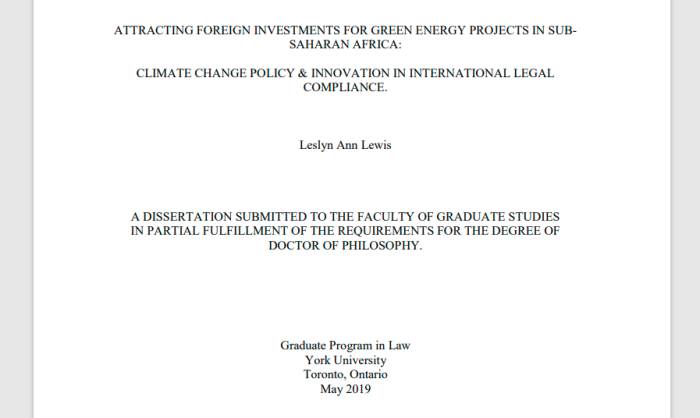
The dissertation consists of several chapters, each with its own abstract. The document itself is large enough to stand alone as a book. This review doesn’t really do justice to the volume of writing, but outlines the more interesting parts.
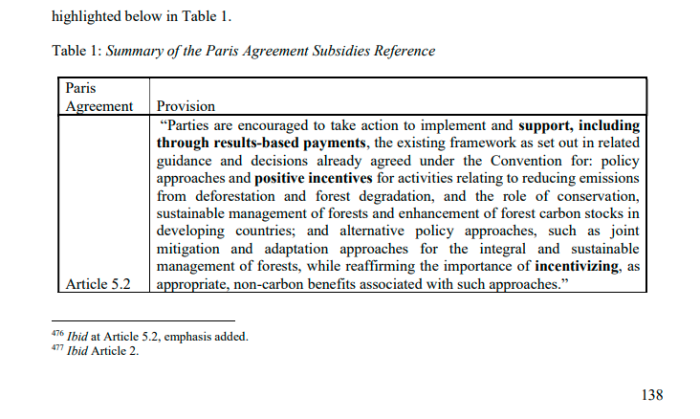
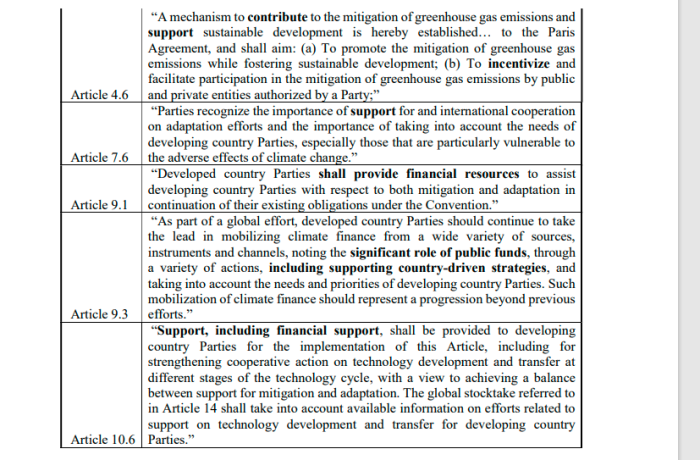
(screenshots from the dissertation)
[Page 112]
ABSTRACT
Climate change abatement strategies are intrinsically linked to policies that encourage the use of alternative energy sources such as renewable energies. The importance of these strategies has been entrenched in various World Trade Organization (WTO) treaties including the Agreement on Subsidies and Countervailing Measures (“SCM Agreement”), Agreement on Trade-related Aspects of Intellectual Property Rights (“TRIPS”), Agreement on Trade-Related Investment Measures (“TRIMs”), as well as pre-WTO treaties like the General Agreement on Tariffs and Trade (“GATT”). The issue of environmental subsides, specifically renewable energy subsidies, have resurfaced in a number of disputes before the WTO Dispute Settlement Body since its first green subsidy case, brought in 2010 by Japan against Canada’s Feed-In Tariff Program (“FIT Program”). In the initial case, Japan alleged that the Ontario FIT Program’s local content requirement was discriminatory against foreign renewable energy products. Moreover, discrimination amounted to a prohibited subsidy under the SCM Agreement and was simultaneously contrary to the most favourable nation status (“MFN”) under the GATT. This decision raises concern about whether the SCM Agreement poses a barrier to governmental policies promoting FIT Programs to encourage renewable energy usage and its impact on the developing world. Specifically, do treaties like the SCM Agreement impede the development of government climate change abatement policies by requiring these programs to meet a minimum standard of trade compliance? Should WTO treaties like the SCM Agreement be amended to include flexibilities to combat climate change, especially in light of the goals set in the 2015 Paris Agreement on climate change? This paper will review the WTO subsidy rules and query whether flexibilities need to be entertained within the area of nonactionable subsidies. This mode of inquiry questions whether FIT Programs be classified as subsidies under the SCM Agreement. If FIT Programs are properly classified as subsidies, should these initiatives be granted an exemption under the SCM Agreement on the basis of public policy— with the goal of facilitating affordable renewable energy and climate change abatement in the developing world?
For better or for worse, there are a number of trade regulations, such as those imposed by the World Trade Organization. These set out guidelines for international trade. Lewis makes an argument that perhaps exceptions should be put into such rules in certain circumstances. In this case, she specifically refers to climate change and complying with the Paris Agreement.
[Page 171]
ABSTRACT
Intellectual property law was constructed to facilitate innovation and development by granting a limited monopoly in exchange for the public’s right to use an invention after the period of exclusivity expires. The trade-off of granting intellectual property protections in reward for the investment in an invention is intended to be a temporary benefit. Trade secrets have been thought of as the weakest form of intellectual property, because non-disclosure is the only form of protection. In other words, infringement of a trade secret occurs upon the unauthorized disclosure of the secret. However, absent reverse engineering and/or legitimate disclosure, protection over trade secrets may arguably extend the exclusivity rights in perpetuity. The debate on “evergreening” has focused largely on extending the life cycle of pharmaceutical patents to the omission of other forms of intellectual property, like trade secrets. The concept has also been widely ignored in relation to climate change abatement technologies. In this regard, considerations around evergreening and trade secrets have been substantially neglected. The loophole in international intellectual property treaties, like Trade Related Aspects of Intellectual Property Rights (“TRIPS”), may lead to inequalities between industrial nations and developing ones, especially for products like photovoltaic solar panels that rely heavily on trade-secret protection. In addition, this non-disclosure may also impact on green technology transfer and may impede climate change abatement strategies in the developing world. This paper will explore the practice of evergreening as it relates to the prospect that trade secret protection may extend beyond the 20-year limit, as prescribed in TRIPS, and the implications of this practice for developing countries that seek to meet climate change commitments as outlined in the 2016 Paris Climate Change Agreement (the “Paris Agreement”). Arguably, the absence of a fixed statutory period for trade secrets may enable patent owners to participate in creative ways to “evergreen” their products or processes, with the result of extending the life-cycle. The practice of evergreening through trade secrets may have a negative impact on the ability of developing nations to meet their national climate change objectives. Specifically, international treaties like TRIPS, the General Agreement on Tariffs and Trade, 1994 (“GATT”), the United Nations Framework Convention on Climate Change (the “UNFCCC”), and the Paris Agreement, have attempted to incorporate climate change flexibilities that assist developing countries in meeting their climate change goals. The efficacy of technology transfer provisions in international law will be examined within the context of how the lack of a fixed term for trade secrets impacts on actual green technology transfer. It will canvass whether trade secret protection of off-patent green technologies acts as an inadvertent barrier to technology transfer within the developing world.
Intellectual property is what it sounds like. When a person creates or discovers things, they have certain rights to it. This makes sense. Patents prevent others from scooping and using another’s inventions, at least for a number of years. Trademarks or copyright prevent others from using creations or designs (subject to fair dealing limitations).
Lewis raises the argument of making exceptions to these IP laws if they were used for a “greater good”, such as combatting climate change.
[Page 245]
ABSTRACT
A number of Conference of Parties (“COP”) to the United Nations Framework on Climate Change (“the UNFCCC”) have addressed the issue of climate change and its effect on the developing world. Energy insecurity must be addressed as a precondition to sustainable development, along with the regional factors that pose legal and institutional barriers to implementing of green energy projects in sub-Saharan Africa. Many sub-Saharan African nations have enacted renewable energy laws and regulations to increase investor confidence in green energy projects. Despite current regulatory enhancements, investors are still reluctant to invest in the region due to financing and political risks. Climate financing could potentially address investor concerns, however, initiatives like the Green Climate Fund (“GC Fund”) and the African Climate Change Fund need to be implemented in a manner that promotes confidence among investors in these high capital projects. Arguably, for climate financing to achieve its full potential in sub-Saharan Africa it must be implemented in an innovative fashion that contemplates the infrastructure, environment and social governance for investments as well as
In this chapter Lewis goes on to make the argument that “climate financing”, (which really means a variety of Carbon taxes), should be implemented in order to fulfill the Paris Agreement and promote development in the 3rd World.
Lewis doesn’t seem to have an issue with intellectual property or trade regulations on principle. She just argues that exceptions should be made for fighting climate change.
These, of course, are just abstracts of a few chapters, not the entire dissertation. The whole document is quite long, nearly 400 pages when all the references and citations are added in.
5. Paris Accord Will Kill Oil & Gas Industry
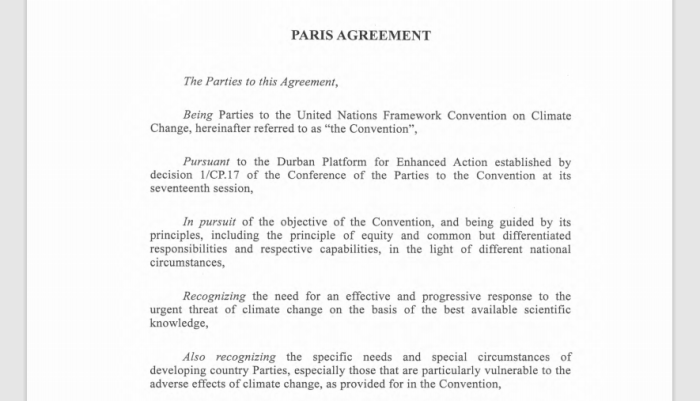
Just read Article #9…..
Article 9
1. Developed country Parties shall provide financial resources to assist developing country Parties with respect to both mitigation and adaptation in continuation of their existing obligations under the Convention.
2. Other Parties are encouraged to provide or continue to provide such support voluntarily.
3. As part of a global effort, developed country Parties should continue to take the lead in mobilizing climate finance from a wide variety of sources, instruments and channels, noting the significant role of public funds, through a variety of actions, including supporting country-driven strategies, and taking into account the needs and priorities of developing country Parties. Such mobilization of climate finance should represent a progression beyond previous efforts.
4. The provision of scaled-up financial resources should aim to achieve a balance between adaptation and mitigation, taking into account country-driven strategies, and the priorities and needs of developing country Parties, especially those that are particularly vulnerable to the adverse effects of climate change and have significant capacity constraints, such as the least developed countries and small island developing States, considering the need for public and grant-based resources for adaptation.
5. Developed country Parties shall biennially communicate indicative quantitative and qualitative information related to paragraphs 1 and 3 of this Article, as applicable, including, as available, projected levels of public financial resources to be provided to developing country Parties. Other Parties providing resources are encouraged to communicate biennially such information on a voluntary basis.
6. The global stocktake referred to in Article 14 shall take into account the relevant information provided by developed country Parties and/or Agreement bodies on efforts related to climate finance.
7. Developed country Parties shall provide transparent and consistent information on support for developing country Parties provided and mobilized through public interventions biennially in accordance with the modalities, procedures and guidelines to be adopted by the Conference of the Parties serving as the meeting of the Parties to this Agreement, at its first session, as stipulated in Article 13, paragraph 13. Other Parties are encouraged to do so.
8. The Financial Mechanism of the Convention, including its operating entities, shall serve as the financial mechanism of this Agreement.
9. The institutions serving this Agreement, including the operating entities of the Financial Mechanism of the Convention, shall aim to ensure efficient access to financial resources through simplified approval procedures and enhanced readiness support for developing country Parties, in particular for the least developed countries and small island developing States, in the context of their national climate strategies and plans.
That is, of course, just Article 9. Here is an earlier review. Claiming to be able to implement the Paris Accord without Carbon taxes is disingenuous, as large parts of the Agreement specifically refer to climate finance.
While many could claim that they never actually read the Agreement, Lewis’ dissertation revolves around this and the Sustainable Development Agenda. She quotes it at length. She has clearly read and understood what is going on. The dissertation is very well written, and it’s clear a lot of work went into it.
So what does Leslyn Lewis actually believe when it comes to climate change, the Paris Agreement, and various UN taxes? Who knows?
Note: Since Lewis did run to become head of the CPC (and official Opposition Leader), and since she is still running for office, she is a public figure.
As an side: Alberta MP Garnett Genuis tried to defend voting for the Paris Agreement in 2017. It didn’t go well. Here is a clip of him with Ezra Levant from Rebel News.
